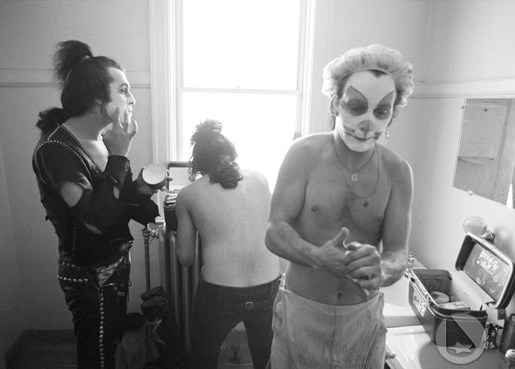Emily Nussbaum writing about the throwback “rockist” angle of the new Scorsese-Jagger-et al TV venture, “Vinyl” in the latest New Yorker:
“'Vinyl,' in other words, is the Hard Rock Café: chaos for tourists. Still, if you squint, you can see what the creative team was going for — a deep dive into the muck of a long-lost Manhattan, all bets off, no safe places, no trigger warnings. For those who long for a pricklier age, the seventies have become something like an escapist fantasyland, and, honestly, I can see the appeal. When I watched 'Argo,' I got obsessed with how fun it looked to be a nineteen-seventies white guy. Tight avocado pants! Before AIDS, after the sexual revolution. Women in charge of the hors d'oeuvres, smoking in the office, and a strong mustache game. It makes sense that TV-makers have begun to explore this material, with ...and new projects due from Baz Luhrmann (South Bronx, disco, black and Latino) and David Simon (Times Square, porn, James Franco playing twins). Fingers crossed that a Lydia Lunch bio-pic starring Kristen Stewart is on the way. It'll be a relief to see shows use different lenses, in less corny genres, to capture those fading memories."Y’know when I first heard about this show, I figured it’d be better if it had been set in Los Angeles, seeing how the music industry was so heavily centered there at the time. With the West Coast cocaine-saturated premise being equally inspired by the writings of Nick Kent, supplemented by stuff from Barney Hoskyn’s Hotel California. But maybe not, because it might come across as too much of a retread of what Paul Thomas Anderson has already covered. And you’d have a hard time fitting punk into the story. And NYC had far more mobsters. And we know how much Scorsese likes mobsters.
In the 1980s, everyone thought that it was impossible that anybody would ever feel nostalgic for the 1970s. But then again, in 1995 not much of anyone could imagine the ‘80s being an era worth being nostalgic about.
But a number of historians have argued that -- in U.S. socio-political terms, at least -- the 1970s didn’t begin until as late as 1973. The above has me wondering when the decade can be said to have gotten underway, musically?* With Altamont? Or a year later, after the deaths of Hendrix and Joplin? Or with the delayed stateside arrival of the first three Black Sabb albums? Or when David Geffen started the Asylum label for the sake of giving Jackson Browne his first recording contract? Or when Dylan released the fuck-off to fans that was Self Portrait, and Greil Marcus supposedly responded by writing, “What is this shit?” Or maybe it’s at a much hazier point -- like whenever it was that major labels took the lesson from Woodstock that there was a huge amount of money to be made from the rawk biz, and devoted their resources to making it a Big Corporate Thing?
_ _ _ _ _ _ _ _ _ _ _ _ _ _ _ _ _ _ _ _ _ _ _ _ _ _ _ _ _ _ _ _ _ _ _ _ _ _ _ _ _ _
* Yes, I'm aware that all of the examples that follow are from the caucasoid end of the musical spectrum. On the r&b side, maybe it could be argued that the 1970s began when Norman Whitfield began steering the Motown sound into heavier, darker territory. Or when Curtis Mayfield left the Impressions. With jazz? Maybe when Creed Taylor set up the Kudu label and thereafter established the fuzak foundations for the type of drek that's now marketed as "Smooooth Jazz."

No comments:
Post a Comment